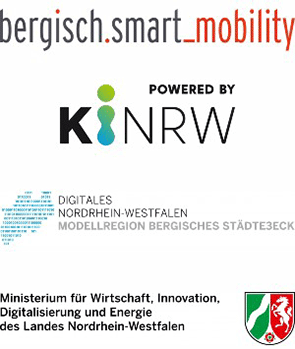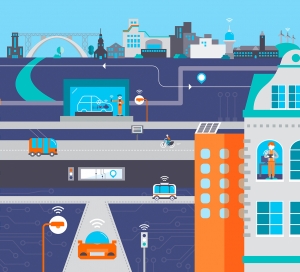Recent accelerated technological progress – artificial intelligence (AI), machine learning and data analytics – is driving the development of digital solutions for innovative mobility concepts. It also promises a wide range of applications such as adaptive traffic flow control, multimodal traffic services and highly automated to autonomous driving. Based on data collected by sensors (on vehicles), application scenarios not directly related to traffic are also conceivable, e.g. weather forecasts, emergency reporting systems or similar.
In addition to the new possibilities for mobility, the disruptive changes brought about by AI, machine learning and data analytics are also creating a need for public administration in cities and regions to take action in areas such as securing economic competitiveness, attracting businesses to the location, or participation and public welfare for the population.
Based on these developments, the project “Bergisch.Smart: KI als Enabler der Mobilität von Morgen” was developed within the framework of the Digital Model Region Bergisches Städtedreieck. The main goals include developing sustainable solutions as opportunities for the region, proving prototypical feasibility and defining standards that can also serve as a blueprint for supra-regional application.
SUB-PROJECT 1:
SMART VEHICLE ARCHITECTURE & ON DEMAND SERVICES
In this sub-project, sensors and the required algorithms as well as the concept for an on-demand service are (further) developed.
SUB-PROJECT 2:
SMART DRIVING IN THE QUARTER
AI-based mobility, including sensors and on-demand services, will be established in selected quarters of the Bergisches Städtedreieck.
Office
The office is available for questions and suggestions to the entire project “Bergisch.Smart_Mobility” for all interested persons from politics, economy, municipality and population. Specific enquiries about the subprojects are also welcome and forwarded to the responsible project partners.





